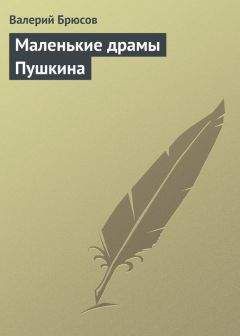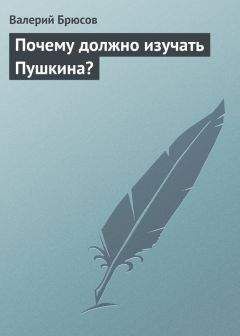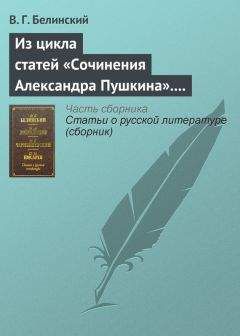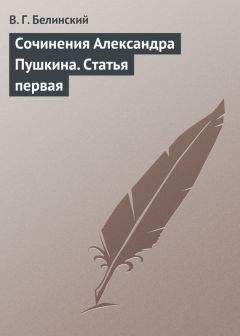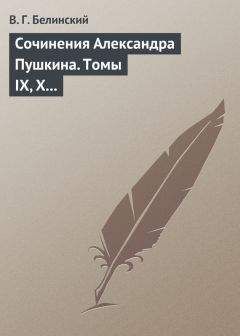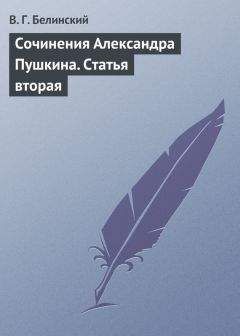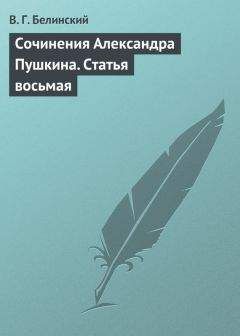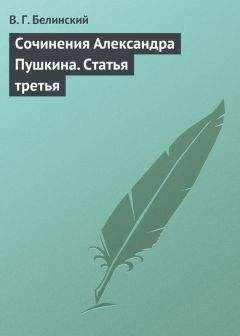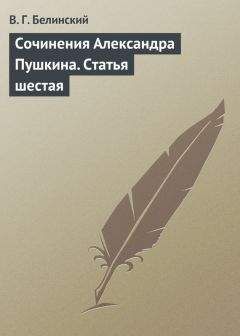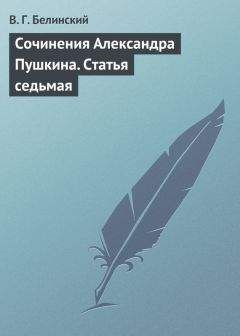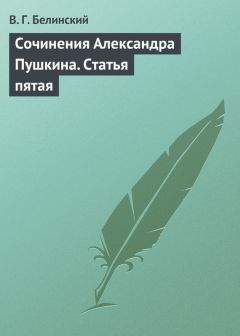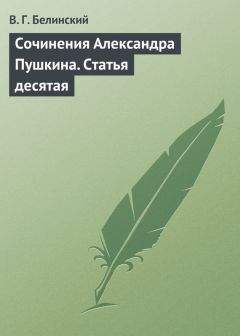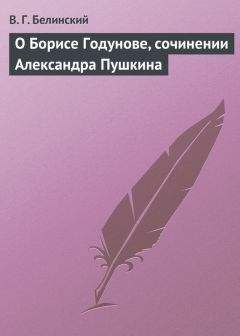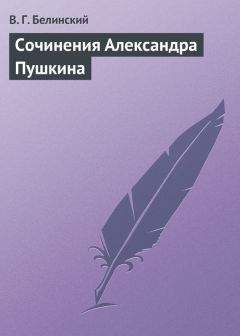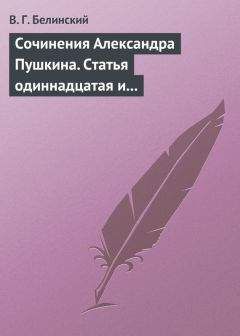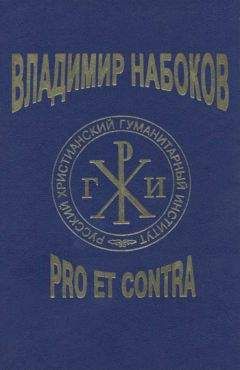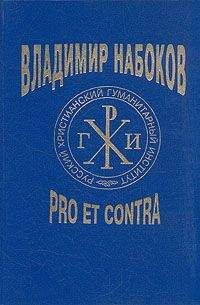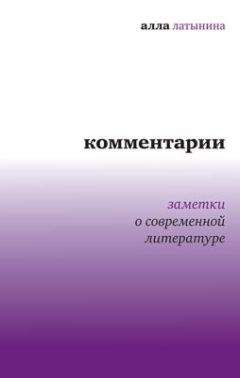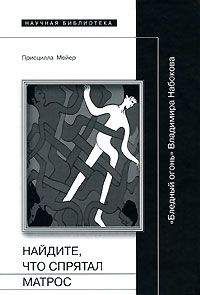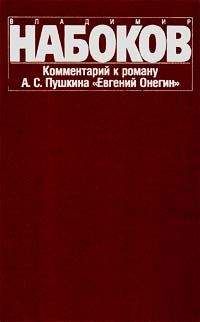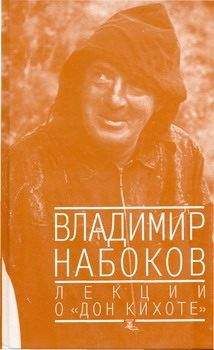Владимир Набоков - Комментарии к «Евгению Онегину» Александра Пушкина
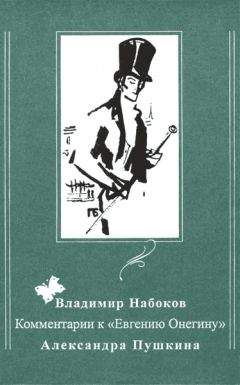
Скачивание начинается... Если скачивание не началось автоматически, пожалуйста нажмите на эту ссылку.
Жалоба
Напишите нам, и мы в срочном порядке примем меры.
Описание книги "Комментарии к «Евгению Онегину» Александра Пушкина"
Описание и краткое содержание "Комментарии к «Евгению Онегину» Александра Пушкина" читать бесплатно онлайн.
Комментарии В. В. Набокова освещают многообразие исторических, литературных и бытовых сторон романа. Книга является оригинальным произведением писателя в жанре научно-исторического комментария. Набоков обращается к «потаенным слоям» романа, прослеживает литературные влияния, связи «Евгения Онегина» с другими произведениями поэта, увлекательно повествует о тайнописи Пушкина.
Предназначена для широкого круга читателей и в первую очередь — для преподавателей и студентов гуманитарных вузов, а также для учителей и учащихся средней школы.
XXX
“Now march.” The two foes, coolly,not aiming yet,
with firm tread, slowly, steadily
4 traversed four paces,
four mortal stairs.
His pistol Eugene then,
not ceasing to advance,
8 gently the first began to raise.
Now they have stepped five paces more,
and Lenski, closing his left eye,
started to level also — but right then
12 Onegin fired.... The clock of fate
has struck: the poet
in silence drops his pistol.
XXXI
and falls. His misty gaze
expresses death, not pain.
4 Thus, slowly, down the slope of hills,
shining with sparkles in the sun,
a lump of snow descends.
Deluged with instant cold,
8 Onegin hastens to the youth,
looks, calls him... vainly:
he is no more. The young bard has
found an untimely end!
12 The storm has blown; the beauteous bloom
has withered at sunrise; the fire
upon the altar has gone out!...
XXXII
was his brow's languid peace.
Under the breast he had been shot clean through;
4 steaming, the blood flowed from the wound.
One moment earlier
in this heart inspiration,
enmity, hope, and love had throbbed,
8 life effervesced, blood burned;
now, as in a deserted house,
all in it is both still and dark,
it has become forever silent.
12 The window boards are shut. The panes with chalk
are whitened over. The chatelaine is gone.
But where, God wot. All trace is lost.
XXXIII
'tis pleasant to enrage a bungling foe;
pleasant to see how, bending stubbornly
4 his buttsome horns, he in the mirror
looks at himself involuntarily
and is ashamed to recognize himself;
more pleasant, friends, if, as the fool he is,
8 he howls out: It is I!
Still pleasanter — in silence to prepare
an honorable grave for him
and quietly at his pale forehead
12 aim, at a gentlemanly distance;
but to dispatch him to his fathers
will hardly pleasant be for you.
XXXIV
be smitten a young pal
who with a saucy glance or repartee
4 or any other bagatelle
insulted you over the bottle,
or even himself, in fiery vexation,
to combat proudly challenged you?
8 Say: what sensation
would take possession of your soul
when, motionless upon the ground,
in front of you, with death upon his brow,
12 he by degrees would stiffen,
when he'd be deaf
and silent to your desperate appeal?
XXXV
his hand squeezing the pistol,
at Lenski Eugene looks.
4 “Well, what — he's dead,” pronounced the neighbor.
Dead!... With this dreadful interjection
smitten, Onegin with a shudder
walks hence and calls his men.
8 Zaretski carefully lays on the sleigh
the frozen corpse;
home he is driving the dread lading.
Sensing the corpse,
12 the horses snort and jib,
with white foam wetting the steel bit,
and like an arrow off they fly.
XXXVI
in the bloom of glad hopes,
not having yet fulfilled them for the world,
4 scarce out of infant clothes,
withered! Where is the ardent stir,
the noble aspiration
of young emotions and young thoughts,
8 exalted, tender, bold?
Where are love's turbulent desires,
the thirst for knowledges and work,
the dread of vice and shame,
12 and you, fond musings,
you, [token] of unearthly life,
you, dreams of sacred poetry!
XXXVII
or, at the least, for glory he was born;
his silenced lyre might have aroused
4 a resonant, uninterrupted ringing
throughout the ages. There awaited
the poet, on the stairway of the world,
perhaps, a lofty stair.
8 His martyred shade has carried
away with him, perhaps,
a sacred mystery, and for us
dead is a life-creating voice,
12 and to his shade beyond the tomb's confines
will not rush up the hymn of races,
the blessing of the ages.
XXXIX
an ordinary lot awaited
the poet. Years of youth would have elapsed:
4 in him the soul's fire would have cooled.
He would have changed in many ways,
have parted with the Muses, married,
up in the country, happy and cornute,
8 have worn a quilted dressing gown;
learned life in its reality,
at forty, had the gout,
drunk, eaten, moped, got fat, decayed,
12 and in his bed, at last,
died in the midst of children,
weepy females, and medicos.
XL
alas, the young lover, the poet,
the pensive dreamer, has been killed
4 by a friend's hand!
There is a spot: left of the village
where inspiration's nursling dwelt,
two pine trees grow, united at the roots;
8 beneath them have meandered streamlets
of the neighboring valley's brook.
'Tis there the plowman likes to rest
and women reapers come to dip
12 their ringing pitchers in the waves;
there, by the brook, in the dense shade
a simple monument is set.
XLI
spring rain upon the herb of fields)
the herdsman, plaiting his pied shoe of bast,
4 sings of the Volga fishermen;
and the young townswoman who spends
the summer in the country,
when headlong on horseback, alone,
8 she scours the fields,
before it halts her steed,
tightening the leathern rein;
and, turning up the gauze veil of her hat,
12 she reads with skimming eyes
the plain inscription — and a tear
dims her soft eyes.
XLII
sunk in a reverie;
a long time, willy-nilly,
4 her soul is full of Lenski's fate;
and she reflects: “What has become of Olga?
Did her heart suffer long?
Or did the season of her tears soon pass?
8 And where's her sister now? And where, that shunner
of people and the world,
of modish belles the modish foe,
where's that begloomed eccentric,
12 the slayer of the youthful poet?”
In due time I shall give you an account
in detail about everything.
XLIII
I love my hero;
though I'll return to him, of course;
4 but now I am not in the mood for him.
The years to austere prose incline,
the years chase pranksome rhyme away,
and I — with a sigh I confess —
8 more indolently dangle after her.
My pen has not its ancient disposition
to mar with scribblings fleeting leaves;
other chill dreams,
12 other stern cares,
both in the social hum and in the still
disturb my soul's sleep.
XLIV
I've come to know new sadness;
I have no expectations for the first,
4 and the old sadness I regret.
Dreams, dreams! Where is your dulcitude?
Where is (its stock rhyme) juventude?
Can it be really true
8 that withered, withered is at last its garland?
Can it be true that really and indeed,
without elegiac conceits,
the springtime of my days is fled
12 (as I in jest kept saying hitherto),
and has it truly no return?
Can it be true that I'll be thirty soon?
XLV
I must, I see, admit.
But, anyway, as friends let's part,
4 O my light youth!
My thanks for the delights,
the melancholy, the dear torments,
the hum, the storms, the feasts,
8 for all, for all your gifts
my thanks to you. In you
amidst turmoils and in the stillness
I have delighted... and in full.
12 Enough! With a clear soul
I now set out on a new course
to rest from my old life.
XLVI
Подписывайтесь на наши страницы в социальных сетях.
Будьте в курсе последних книжных новинок, комментируйте, обсуждайте. Мы ждём Вас!
Похожие книги на "Комментарии к «Евгению Онегину» Александра Пушкина"
Книги похожие на "Комментарии к «Евгению Онегину» Александра Пушкина" читать онлайн или скачать бесплатно полные версии.
Мы рекомендуем Вам зарегистрироваться либо войти на сайт под своим именем.
Отзывы о "Владимир Набоков - Комментарии к «Евгению Онегину» Александра Пушкина"
Отзывы читателей о книге "Комментарии к «Евгению Онегину» Александра Пушкина", комментарии и мнения людей о произведении.





